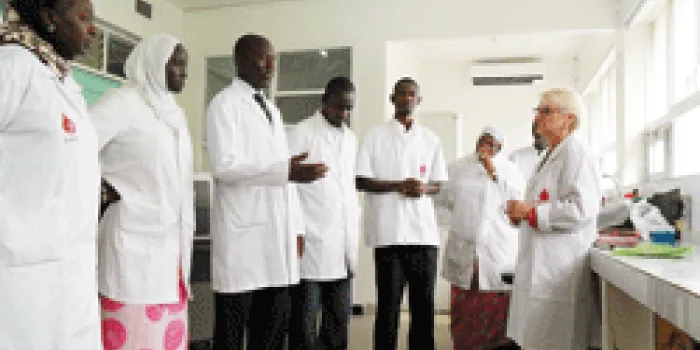The story of Saliou Diop, MD, is at the center of the World Federation of Hemophilia’s (WFH) newly released film, The Winning Coalition. The film, the first in the WFH’s 50th anniversary video series, documents how Diop became the director of the National Blood Transfusion Centre in Senegal, Africa, and helped improved hemophilia care in his country fifteen-fold in just 20 years.
“In 1990 in Senegal, mostly all our patients were adolescents or adults because there was no pediatric diagnosis,” says Diop. That’s when he began his internship in hematology. Only 20 patients with hemophilia had been diagnosed in Senegal at the time. By 2011, 116 patients with hemophilia A and B had been identified.
Through his commitment, and with help from the WFH, Diop built a winning coalition of doctors, patients and government supporters to make treatment available to all people with bleeding disorders in Senegal.
In 1999, WFH selected Diop for a six-week training fellowship at Centre de l’Hémophilie François Josso Hôpital Necker in Paris. When he returned to Senegal, Diop tailor-made training sessions for hematologists and developed educational outreach programs where he worked, the National Blood Transfusion Centre, which is the main hemophilia treatment center in Dakar. “We also have a clinic for patients in this center. We have an orthopedist, a dentist, and we have a nurse who plays a real role. And we have a lab.” Diop’s center also began a medical twinning partnership with the Paris hospital where he did his fellowship to improve care in Dakar and in other West African countries.
Training local medical personnel is an essential part of the WFH plan to improve care for patients in countries where the access to care is so minimal. “You can invest in machines, you can invest in treatment protocol and you can invest in medications. But the most rewarding is investing in people—doing good training and giving good education to people,” says Assad Haffar, MD, WFH regional program manager for Africa and the Middle East. In the video, Haffar describes the establishment of a national care system for people with bleeding disorders in Senegal. It takes local doctors, patients, governments and international volunteers coming together to improve diagnosis rates and provide adequate treatment and care in underserved countries worldwide.
As the WFH marks its 50th anniversary, many of the accomplishments, milestones and lessons learned will be remembered. One of the many ways the WFH is marking this anniversary with the global bleeding disorders community is through 12 video podcasts, produced and directed by Marilyn Ness, Emmy Award–winning filmmaker and director of the 2011 documentary Bad Blood.
The Winning Coalition video demonstrates how the investment in individuals along with advocacy and a little persistence can help close the gap in care. New videos in the series, subtitled in Spanish and French, will be released every six weeks through 2013.

